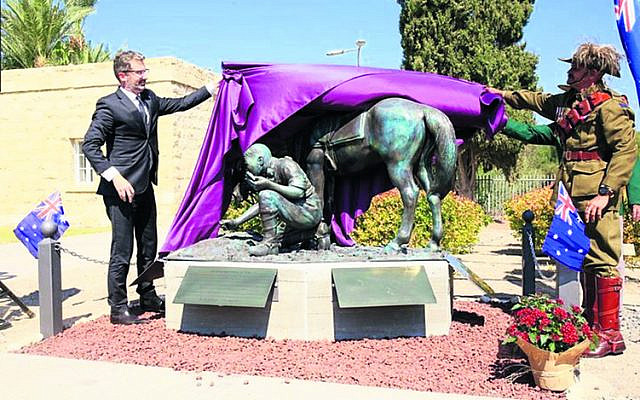‘Aboriginal Soldier’ statue dedicated in Tzemach
A statue has been unveiled in the Israeli town of Tzemach honouring the Indigenous Australians who fought there.

GARETH NARUNSKY
WHILE not as well known as the Charge of Beersheba, the Battle of Tzemach, fought near the end of World War I, was equally heroic.
Last week, a new statue was unveiled in the town to pay tribute to the many Indigenous Australians – known as the “Queensland Black Watch” – who fought in the battle, serving their country abroad with distinction at a time when they did not have equal rights at home.
The statue Aboriginal Soldier and his Horse was designed by Australian artist Jennifer Marshall and depicts Aboriginal Light Horseman Jack Pollard, who fought in the battle, with his horse.
His grandson, Mark Pollard, joined other descendants of troops in Israel for the unveiling.
Australian ambassador to Israel Chris Cannan said he was privileged to be among descendants of Aboriginal troopers from the Eleventh Light Horse Regiment at the ceremony.
“We commemorate the sacrifice of Australian troops who fought here 101 years ago today. Australians who planted the roots and set the tone for Australia’s commitments to this region and the strong and longstanding friendship between Australian and Israel,” he said at the September 25 event. “We pay particular tribute to the contributions of the Australian Aboriginal troopers of the First World War.”
Australian Light Horse Association director Barry Rodgers said the Indigenous troops were “great soldiers”. “Many of them had been … stockmen and they were great horsemen as well,” he said.
“Sadly, at that time in our Australian history these men were not recognised as Australian citizens. They had no voting rights, yet they had signed a blank cheque made payable to the Australian government for an amount up to and including their own lives.
“As a result I think they’re worthy of double honour today.”
Before dawn on September 25, 1918, the Fourth, Eleventh and Twelfth Light Horse regiments approached Tzemach, strategic for its train station on the Damascus railway line. As they approached, they were taken by surprise by heavy Ottoman and German gunfire.
An “unprecedented” decision was taken, according to Israeli WWI historian Eran Tearosh, to charge in darkness towards the gunfire. By 5.30am the Australians had captured the town.
Fourteen Light Horsemen, including three officers, were killed.

comments